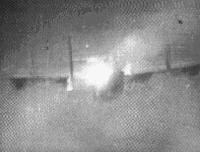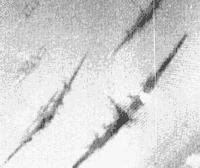|
The Eye of the Storm: The Birth Of the Luftwaffe's Elite Sturm Units by Dillon "Jazz" Poole |
||||
|
When the discussion of suicide pilots comes up, everyone thinks of the Kamikaze units of the Japanese military in the war in the Pacific. But the Poles of the Polish Air Force also resorted to ramming, and they fought valiantly during their short war with Germany in September 1939. But it wasn't an endorsed tactic, nor did Russia endorse the occasional ramming in air combat when it was thrust into the war with Germany. The origin of Sturm tactics can be traced back to Reichmarschall Hermann Goering's insistence that Reich defense units should start ramming bombers as a last resort. Although German Sturm units weren't tasked with ramming bombers exclusively, it was one of the many tactics employed as a last measure. With the exception of Rammkommando Elbe, no German units were specifically tasked for suicide missions, and even Rammkommando Elbe's pilots only rammed when there was a chance to get out of plane alive. Goering's Orders: 1943 On 4 October 1943, the Eighth Air Force attacked Frankfurt-on-Main. The local party leader in Frankfurt protested very loudly about the fact that the "terror bombers" were not interecepted. This made Goering issue an order to all Reich defense units:
After that the heated orders were put to rest and were virtually forgotten. Then Major Hans-Georg von Kornatzki persuaded certain powers to let him form an experimental unit based on the army's Sturm units who got in close to enemy units and engaged in hand-to-hand combat. He envisioned a unit designed to break up the heavily armed 4-engined bombers of the Eighth Air Force. Members pledged themselves to the unit by a handshake from Kornatzki. The rules of engagement in the unit were as follows:
The new Staffel became operational in January 1944 under the command of Major Kornatzki. They were based alongside the First Gruppe of Jagdgeschwader 1 (I./JG1) at Dortmund airfield. |
 On 11 January 1944, Oberleutnant Zehart downed a B-17 and claimed the Staffel's first victory. Unteroffizier Willi Maximowitz scored his first victory on 30 January near Hannover. Due to the increased weight of the new fighters being used, the fighters of SturmStaffel 1 had to be escorted by Bf109s, who had better performance at altitude. The unit became an immediate success and was soon considered an elite unit. Soon many Jagdgeschwaders began forming Sturm units of their own. The first of these was the new Fourth Gruppe of Jagdgeschwader 3 "Udet" (IV.(Sturm)/JG3) led by Hauptman Wilhelm Moritz. Another unit, the Second Gruppe of Jagdgeschwader 4 (II.(Sturm)/JG4) was built around the original SturmStaffel 1, and command was given to none other than Major von Kornatzki. Few pilots resorted to actually ramming a bomber unless they had the chance of escaping safely. Oblt. Werner Gerth, Staffelkapitan of the 14th Staffel of JG3 "Udet" (14.(Sturm)/JG3) was shot down at least 11 times and was finally killed when his parachute failed to open after ramming a B-17 near Halle.
 The Weapon of the Sturmflieger Due to the new mission of SturmStaffel 1, better equipped aircraft had to be used to effectively combat the heavy bombers at close ranges. The Focke Wulf 190A-series was known to be a good bomber interceptor. The only problem was that closure time for stern attacks by Fw190s was very slow, leaving the Fw190s vulnerable to both bomber gunners and escorting fighters. Go to Part II
|
|||
|
Copyright © 1997 - 2000 COMBATSIM.COM, INC. All Rights Reserved. Last Updated October 7th, 1999 |
||||
